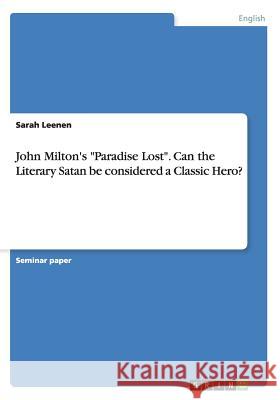John Milton's Paradise Lost. Can the Literary Satan be considered a Classic Hero? » książka
John Milton's Paradise Lost. Can the Literary Satan be considered a Classic Hero?
ISBN-13: 9783668071377 / Angielski / Miękka / 2015 / 20 str.
Seminar paper from the year 2013 in the subject English Language and Literature Studies - Literature, grade: 1,3, University of Duisburg-Essen, language: English, abstract: This essay analyzes the character of Satan in John Milton's epic "Paradise Lost" and discusses the question whether he might be considered a classic hero. Paradise Lost, John Milton's religious epic, has astounded and fascinated readers throughout time and as such may be one of the most highly discussed examples of English literature within living memory. The controversy of Paradise Lost began with its publication in 1674 by John Milton during the time of the Interregnum in England, and even nowadays its subject remains an essential fixture in Western literary canon as well as an important source of inspiration for numerous scholars and artists. Therefore it is interesting to analyze the reasons why a literary work that has been written more than three centuries ago, continues to be the topic and the central cause for scholars' debate and countless essays and interpretations. One of the most significant reasons may be the different manners of interpretation, as several aspects may come into focus, while reading Paradise Lost. Determined the counterpart of God, Satan is commonly described as the embodiment of evil. Nevertheless, Milton presents the character depth of his protagonist, so that questions of Satan being a heroic figure arise. In consideration of Satan's character traits, his downfall from an archangel of heaven to the prince of hell and lastly to the tempter of mankind as illustrated in Paradise Lost should be analyzed. As the historical reading is a further way of interpreting Paradise Lost, parallels between Satan and historical personalities of the British Revolution, namely Oliver Cromwell and Charles I, are examined. Furthermore the importance of fate in contrast to the belief of free will considering Satan's attitude is put into focus. In order to compare Satan's characte











